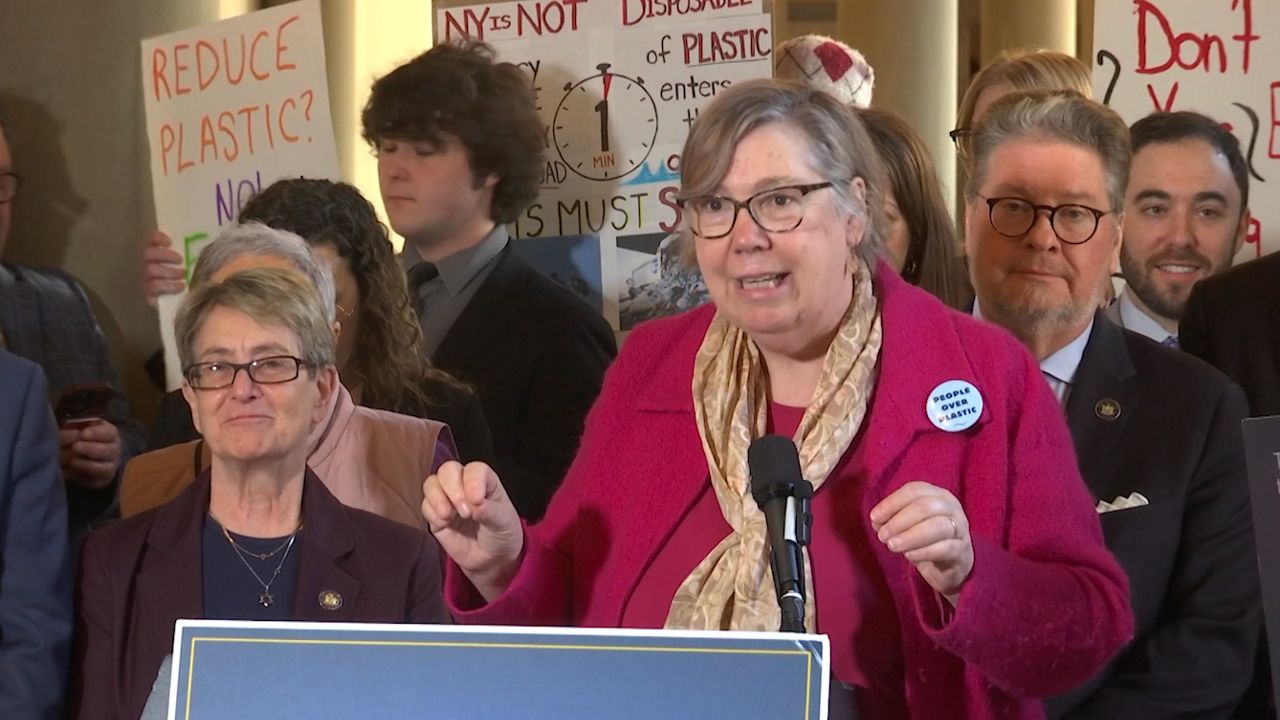The Plastic Reduction and Recycling Infrastructure Act is officially on the move, advancing out of committee and to the Senate floor after passing the upper chamber last year.
One year after a chaotic closing week of session upended by Governor Kathy Hochul’s pause of congestion pricing resulted in the curtain being lowered before the bill could get underneath in the Assembly, sponsors are looking to avoid a repeat this year when the time compression is thanks to the latest state budget in 15 years.
State Sen. Pete Harckham celebrated the advancement Tuesday, telling Spectrum News 1 that he feels the controversial piece of legislation has been successfully amended to address industry concerns.
“In the next coming days, the bill will be on the floor for a vote,” he said. “This is a bill that we’ve worked on for years; we’ve made 25 major compromises to industry in the last draft.”
In the Assembly, Assemblymember Deborah Glick carries the "extended producer responsibility" legislation, which would require companies with an income in excess of $1 million to reduce their use of plastic by 30 percent over 12 years and phase out 17 toxic chemicals.
“You really shouldn’t be close to formaldehyde until you’re already being buried,” she said.
Glick reported that on her end, the push has turned to ensuring there is padding in addition to the bill’s more than 75 guaranteed yes votes in the chamber of 150 members, where Democrats have the edge 103-47.
“We have well over 75 co-sponsors, and now we’re just checking to get the last bit of insurance that we have additional yes votes so there’s confidence that if somebody is out sick, they have to take their child to the doctor or there is a funeral for someone in their family, we have enough votes so we’re not counting down to the last vote,” she said. “I believe that we will get this done."
Judith Enck, former regional EPA administrator and president of Beyond Plastics, has spent the legislative session working to get the bill over the finish line.
She said in addition to phasing out materials and targeting chemical recycling, the legislation also institutes a fee for plastic packaging to be paid to municipalities. The bill also contains other initiatives to regulate recycling infrastructure and weed out materials not easily recycled.
“It’s good for our health. We want fewer pieces of microplastics in our bodies, it’s good for the environment, and it saves tax dollars,” she said.
Many Republicans, along with the Business Council of New York State, oppose the bill, arguing its mandates will drive up costs while stifling innovation.
“It’s going to have a cost impact as companies have to reformulate not only their products but their processes. It’s also going to make some products in our view not sellable in New York State,” said Ken Pokalsky, vice president of The Business Council.
The Business Council is backing another bill sponsored by state Sen. Monica Martinez that also claims to put the responsibility on the producer. They argue it avoids what they describe as unrealistic mandates, excessive material bans that they say target materials already regulated by the FDA, and would allow more industry input.
It would create a "producer responsibility advisory board" overseen by the state Department of Environmental Conservation which would be in charge of carrying out the bill’s provisions.
“The legislature designs the basic policy, and the regulator agency is in charge of making sure the program works,” he said.
Enck has argued the alternative bill is lightweight because because it gives most of its regulatory power to the DEC, when she says it belongs with the state Legislature.
Glick, who chairs the environmental committee, dismissed it as an effort to muddy the waters.
“Businesses are run by people and people hate change,” she said. “I think a lot of it is ‘oh, do we have to do this?’ ”
With Glick and Harckham chairing their respective committees, the chances of that bill moving are slim. Glick said she is confident the extra three days the Assembly has added to the legislative session will ensure there is time to get the bill through in that chamber.


